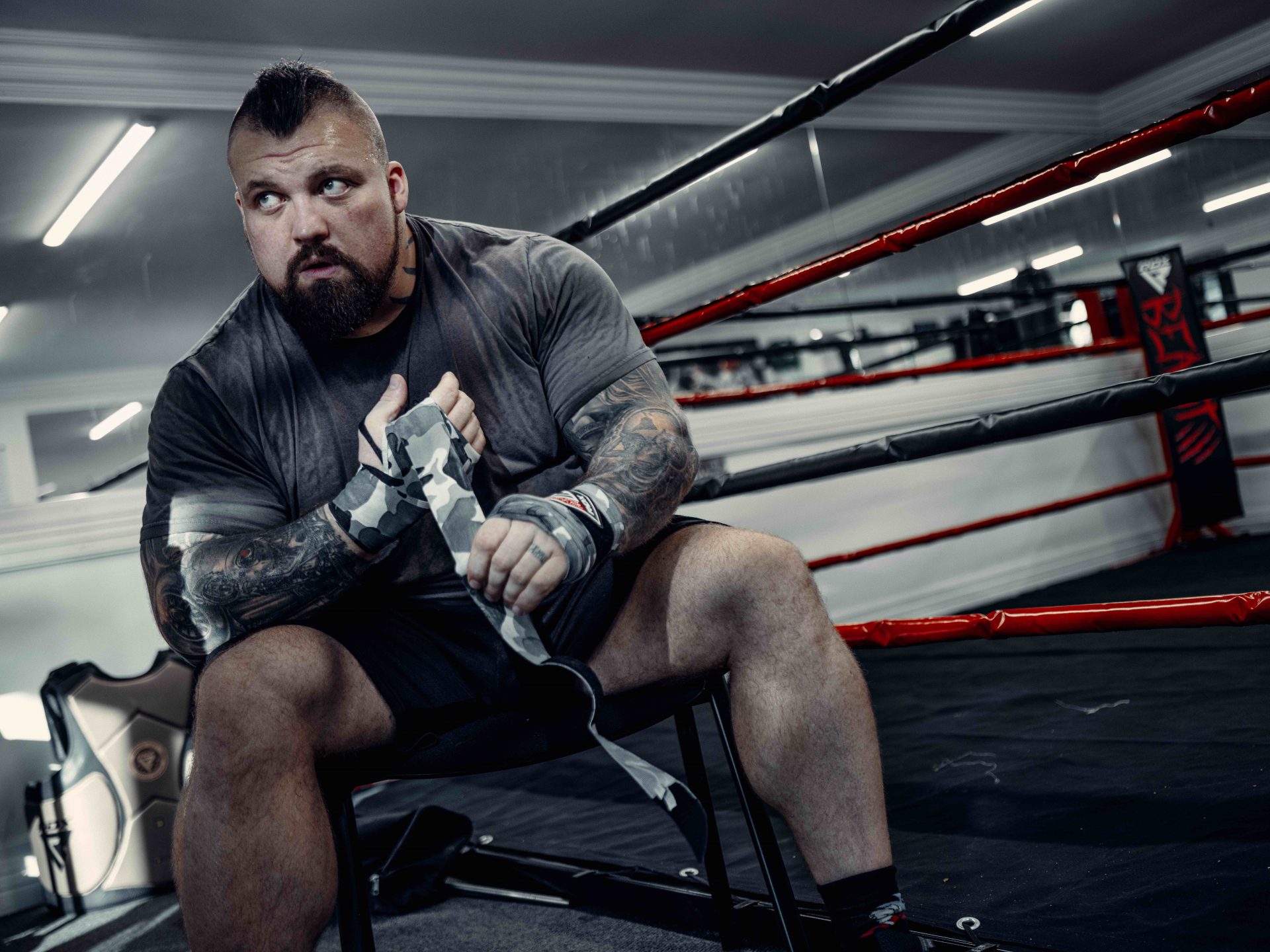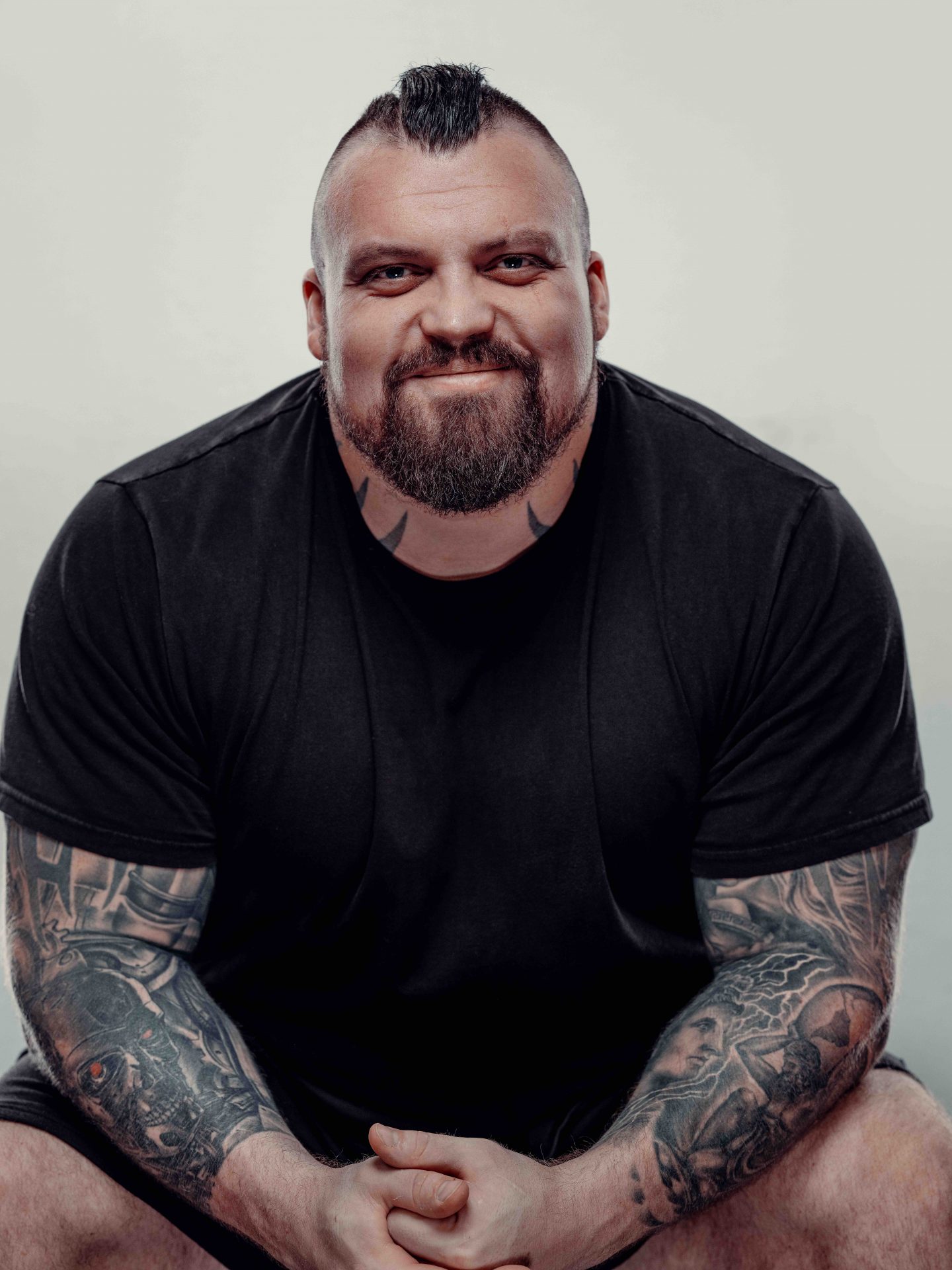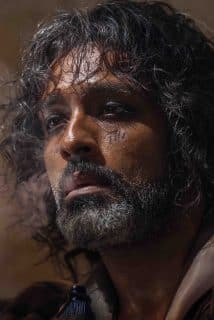Eddie Hall: “Something has to change to tackle male suicide”
Culture
Eddie Hall, the World's Strongest Man, talks to us about his new audiobook and why he's aiming to reduce the stigma around mental health.
Eddie ‘The Beast’ Hall is obviously an extraordinary man. The World’s Strongest Man in fact, a title he won in 2017, which marked the climax of a remarkable rise from truck mechanic to one of the most admired sporting figures on the planet. But Eddie is extraordinary in another way: he is someone who has shared his stories of depression and anxiety every step of his journey. In this, he has made the extraordinary ordinary, meaning that by opening up in this raw and real way he has brought success down to a level which is relatable and doesn’t spare on the difficulties he’s faced. Importantly, this has created a space for men’s mental health discussions – if Eddie, the World’s Strongest Man, has to deal with anxiety and depression, then it must affect us all to some degree. And we should talk about it.
Which is where Eddie’s new audiobook, ‘The World’s Strongest Audiobook’, comes in. It’s a brilliantly unfiltered listen that includes revelatory behind-the-scenes stories about his famous boxing match with Thor, but also demonstrates the value in having a man like Eddie talk through the lows he’s faced as well as the highs. We managed to grab some time with Eddie to find out more…
Hi Eddie, can you tell us about the audiobook please?
Yeah, the audiobook picks up from the afterlife of winning the World’s Strongest Man, and the journey of the highs and lows after such a euphoric title win. There’s a hell of a lot goes on, including the boxing fight with my arch rival Thor. But it’s mainly about the big thing all these world champions and gold medallists, and people like Tyson Fury have to face: that there’s this massive high, this huge euphoria, and then there’s this massive crash after. I think that’s the great lesson – life isn’t all about the top thing, it’s not about being euphoric all the time. Winning the world Strongest Man was one of the best moments of my life, but it was also one of the worst, because afterwards, that massive hit of depression came in. And what do you do? How do you get that amazing feeling again?
The audiobook is brilliantly sweary and very raw and real, was that important to you?
It’s important to keep things real and raw, because that’s who I am. I come from humble beginnings. Seven years ago, I was still working as a full time truck mechanic working 60 hours a week. And also working the doors for 30-40 hours a week, plus doing my strength training for 15-20 hours a week. I was killing myself. And I was killing myself because I was chasing that dream of becoming successful. Don’t get me wrong, I don’t want to put anyone down, some people are quite happy doing a nine to five job and having kids and doing their daily chores, but that’s not me. I have to try and do more. Breaking free of it, and working for myself, is for me, a happiness. It’s a great way to live your life. And winning the World’s Strongest Man was a great way for me to become that person and work for myself, and get away from the big corporate companies, working 100 hours a week to make money for somebody else.
The ‘strength’ in the title is not just about physical strength it’s mental strength too. What was your mindset on the way to the big title and how did it shift after?
Training to be the World’s Strongest Man was very hard because of all the hours you have to put in. Having the full time job and the side job as well, was even harder. You almost have to kid yourself. I kept saying to my wife day in, day out, ‘It’ll pay off one day, all these hours of me not being around, doing all this work, will pay off one day.” And I suppose you have got to kid yourself in some respect, about why you’re doing all this hard work. You’ve got to have a goal, and sometimes that goal can be super unrealistic. I just kept my head down, and I wouldn’t give up until I achieved the dream of becoming the World’s Strongest Man. When I achieved it, I suppose the problem was filling that void. All these years chasing a huge dream and afterwards it’s just like, what the fuck now? What do you do?
Within a year, I was doing endorsements, books, TV shows, just keeping myself busy filling that void, so to say. And that’s the key for me, to keep busy, for the mental health aspect. Keep chasing a goal. Because if you’ve got no goals to chase, you can give up internally. And I think that’s a very dangerous place to be.
We hear in the book that you were five years old watching the World’s Strongest Man on TV and you said to your family, ‘that’s going to be me one day.’ What was it that appealed to you about it?
I suppose it was my family’s reaction. Sitting watching the World’s Strongest Man on TV, watching these ginormous men pull planes and lift up the stones was mesmerising for me as a little boy. But I remember looking around the room and watching my whole family watch it and seeing their jaws drop. I just thought to myself, what a reaction, and I suppose being the youngest of three brothers, I was always craving that reaction. You always want the praise, because you’ve got this competitive nature. I think that’s where it all stemmed from – I wanted to be competitive in everything that I did, whether it be eating a pizza or running to school, I wanted to beat my brothers. Everything was a competition. And I suppose when my brothers were bigger and stronger than me, I saw that as a challenge to get bigger and stronger and be that guy on TV and become the World’s Strongest Man. It was very petty behaviour but at the time I just wanted to beat my brothers. As I got older, I was actually an Olympic standard swimmer. I competed in swimming against my older brothers, and then surpassed them and I started winning national championships. I was on the GB Olympic squad and I suppose my brothers got replaced by other people, by the Ian Thorpes and the Mark Fosters, these Olympic champions. And then I got into the bodybuilding strongman and those brother models, so to speak, became the Mariusz Pudzianowskis, the Brian Shaws, and I just kept chasing people down all the time. I think that’s that competitive nature within me of being the youngest of three brothers that gave me that blessing, really.
Is there a difference between sort of healthy competition and unhealthy competition?
Well, there’s a massive difference. I think having competitiveness with your brothers is very healthy. It set you up, it blueprinted the rest of my life. Everything was a competition, and I had to give it all I had, so I could beat my brothers and I think that broke off into my jobs, my career, my social life, everything. I think it’s healthy competition, and there’s nothing wrong with that. Definitely not.
But can it become a bit too much sometimes?
Sometimes yeah. I mean, if I go on a game show and I don’t win, I also get angry with myself. You can get quite obsessive, but that’s who I am. And I think that’s why I won the World’s Strongest Man because I am so competitive. But I can take losses like everybody else. And I think a big message is, you’ve got to lose a lot of things before you win a lot of things.
It was a very male world that you were working and competing in. On the mental health side, was there any kind of support? Or any softer kind of talk at all in that respect?
I would say not. When I first suffered with depression and anxiety, I was 12 years old. I was seeing a psychiatrist and was prescribed Prozac when I was in high school. And you hear other kids who are suffering with it and everyone points and laughs, saying ‘you’re a pussy.’ That’s the language you get in high school – it’s very petty, but that’s when boys and men don’t open up, because of peer pressure. Especially back then, you’re talking 20 years ago, when mental health wasn’t seen as a condition really, it was a laughable thing. If somebody said they were depressed, you were just sad, there wasn’t a clinical thing around it. And I came under that category, so I couldn’t really talk to anyone. I tried to talk to my parents, and my Nana about it; I was very, very close to my grandmother, and, bless her soul, even she when I tried to talk to her about it, a 13 year old kid telling her that he was thinking about killing himself, and she’s like, ‘what’s up with you, just pick yourself up, stop thinking about things.’ And that came from one of the most amazing role models in my life. She didn’t understand it, you know. So I suppose going through that transition from high school to late teens and then getting into strongman, it was tough, because talking about it to anyone was seen as laughable. So you had to keep it bottled up and learn to deal with it.
Did that mean that when you did sort of experience depression, after you’d won, you didn’t really know what was happening to you?
It was a tough one because I spent so long chasing a goal, and I think having a goal is a big thing, you’ve got to have goals in life, you got to chase something down. Because if you if you haven’t, you’re on a lost path, really, you fall into that category of being a sheep. Waking up, going to work, coming back, doing shopping, taking the kids to school, it can become very boring, repetitive and become mentally draining. It was something that scared me after I won the World’s Strongest Man. Two days later, I was back doing the dishes at home!
And I think that’s another big key message, that I’m no better than everybody else. I might have won the World’s Strongest Man, but I’m no better than you, I’m no better than anybody else. I’ve still got to sit down and take a shit like everybody else! That’s something that I’ve grown to understand after winning such big titles. No matter what you do, no matter who you are, you’re no better than everybody else.
And after having such a euphoric feeling like being the world’s strongest man, you come back down to reality. A year later, you lose the title, and someone else wins it. You’re always gonna have the name of World’s Strongest Man, but you’re not, you know? It’s like a drug almost, you get that euphoria, and you want to keep it up there. But it’s not possible, it has to come back down. And you have to get that euphoria back up again. What the fuck can I do to replicate winning the world’s strongest man on a daily basis? Impossible. So for me, it was a hard process of coming back down to reality, and getting back to normal life and getting back into looking after their kids, taking the kids to school and shopping and getting the work back on, basically.
Talking about mental health in the public eye as you do, what kind of response do you get from people?
I mean, my inbox on Facebook and Instagram is absolutely jam packed. It’s not tens, it’s hundreds of messages a day from people that are struggling. To see my story helps them to push forward and get through their struggles. I’m making a difference with what I’m doing, talking about it and pushing through the boundaries. It does help people because I see it on a daily basis, with people reaching out all the time. And you look at the statistics at the minute – male suicide is through the roof. 90 men a week die by suicide, that’s one every two hours. That’s fucking so bad. So fucking bad. Something’s got to change really drastically. The mental health system in the UK is abysmal. I’m quite happy to say that. No matter what anyone says, it’s abysmal. If you go to the doctors for mental health problems, you’re talking 12 weeks before you can see a psychiatrist. Nine times out of 10, they’ll just stick you on some tablets, and they don’t have a fucking clue what they’re doing to you. It’s a big, big problem at the minute. And I think people like myself, opening up and talking about it just makes people realise that they’re not alone. I think that’s the number one fear factor. People are going through this thinking, ‘no one else is going through what I’m going through right now, no one else is having these problems and anxiety attacks and depression and feeling like they want to kill themselves.’ But in actual fact, they are.
And people like myself do struggle – it doesn’t matter who you are, it doesn’t matter what you’ve done, or what you’ve achieved in life, everyone goes through their own struggles on different paths. Yes, I’m in a different world to most people, and people think money fixes problems, but it really doesn’t. If anything, it adds more stress. Sometimes I wish I could go back to the days where I wasn’t well known, back to a normal life, because it’s very stressful in this day and age, being in the public eye as much as I am. There’s a lot of pressure on you to be this happy, smiley, sort of person that is faultless, and it’s just so far from the truth. At the end of the day, I’m a human being with a brain and a heart, like everybody else.
How do you maintain your mental health now? Do you have certain routines?
I think what I’ve learned over the years is that you’re never going to cure mental health. There’s no flip switch, there’s no magic pill, there’s no hypnotherapist that’s going to cure you overnight. You’ve got to implement tools, and my tool was going to the gym and working out. That was my tool for feeling better. And I just think over the years, I’ve just learned different techniques to add on top of that. I do a lot of breathing exercises, the Wim Hof breathing method. I do cold therapy, most days I do meditation, just things like that. And again, most people would laugh at the world’s strongest men meditating, but it helps me, it helps me keep my focus, it helps me move forward in life and keep my head on my shoulders. So I tell people about it.
It helps with men, because blokes being blokes, we look around at what everyone else is doing…
Yeah, and I must emphasise that my tools, going to the gym and working out, might not be yours. Yours might be drag racing might, playing cards, skydiving, or whatever, but I think the important thing that everyone has tools, they just often don’t know what they are. If you’re really struggling, there are tools out there to help you know. Talk to people, talk to your mum, your dad, your brothers, your girlfriend, your boyfriend. Talking is a big one. Finding those tools and using them and keep using them being consistent is a big key.
In the book you go through the fight with Thor. How did you cope with all that, because it was such a big deal?
It was huge. It was such a stressful time for me. You know, I’ve got a lot of got a lot going on outside of the boxing world at home and family life as well. So yes it was great to go toe-to-toe with Thor, to end our differences. It released a lot of tension there. But it was tough. Losing a fight in life is tough. Losing a fight in such a huge public domain is even tougher, you know? But you don’t win everything in life, you have to lose a few times to learn and better yourself, and come back, and be better. And that’s how I saw the fight. You have to have losses, and there’s a lot of positives about it, it can definitely change you and help you learn and progress.
What are your current goals?
Tough question. Well, I was out the country for months and months, doing the fight and that was a very self contained, almost military operation. I’ve been married to my wife 10 years next month, and I’ve probably spent the last five years doing what I wanted, and she’s been so supportive and helped me to do what I’ve chosen to do. I suppose now after the fight, it’s give me some time to reflect on what’s important, and I’m still going through that process. Now I’m picking it up back on the TV shows, on some businesses, and just taking some time for me and the family, really, because I owe it to my wife. I’ve made all the decisions so far, so now I’m sitting back, and I suppose those decisions don’t become mine, they become ours. And that’s where I’m at now. But there’s lots of opportunities, TV shows, more fights, movies, so I’m picking my path right now.
What would you like listeners to get from the audiobook?
The audio book is about the ups and downs in life. Life is not plain sailing. It’s a very hard journey. People like myself go through and battle demons. And I think this is just going to be a great help for a lot of people out there to show that you’re not alone. Life is about wins and losses, and it’s about picking yourself up after both of those, because even after winning, you can have lows, and after, after losing, you can have lows. So it’s about picking yourself up after any of these situations, retargeting and keep moving forwards. It has tools to get through those episodes, and also lets people know that you’re not alone. There’s millions and billions of people out there going through struggles. You’re not alone. We’re all in this together.
‘The World’s Strongest Audiobook is out now’
Trending

Join The Book of Man
Sign up to our daily newsletters to join the frontline of the revolution in masculinity.





















